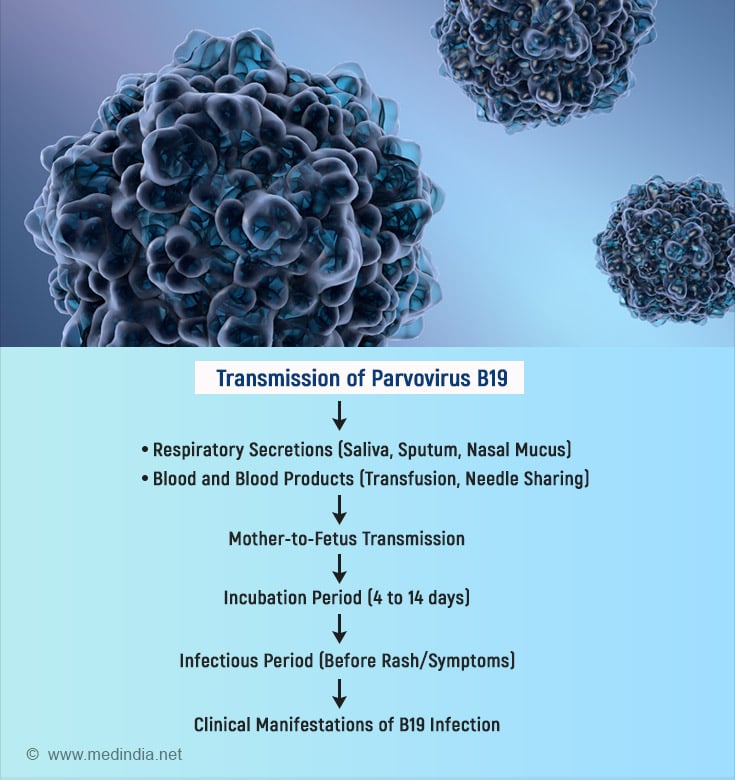- Human Parvovirus B19 - (https://www.ncbi.nlm.nih.gov/pmc/articles/PMC118081/#r133)
- About Parvovirus B19 - (https://www.cdc.gov/parvovirus-b19/about/index.html)
About
Parvovirus B19, often called the "fifth disease virus," is more than just a childhood infection. This tiny, elusive virus can cause a range of symptoms, from a mild rash to serious health complications, particularly for pregnant women and those with weakened immune systems.
B19 is most famously associated with erythema infectiosum, commonly known as "fifth disease," a mild rash illness in children. However, in certain populations, such as immunocompromised individuals or those with underlying hematologic disorders, the virus can cause severe complications(1✔ ✔Trusted Source
Human Parvovirus B19
Go to source).
Did You Know?
Parvovirus B19 can lead to severe anemia in those with blood disorders. #parvovirusb19 #medindia #viralinfection
How is Parvovirus B19 Transmitted?
Parvovirus B19 is primarily spread through respiratory secretions, such as saliva, sputum, or nasal mucus, when an infected person coughs or sneezes. The virus can also be transmitted through blood and blood products and from mother to fetus during pregnancy. The incubation period for B19 infection ranges from 4 to 14 days, with the infectious period occurring before the onset of the rash or other symptoms.

Clinical Manifestations of Parvovirus B19 Infection
Parvovirus B19 infection can present with a wide range of clinical manifestations depending on the patient's age, immune status, and underlying health conditions(2✔ ✔Trusted Source
About Parvovirus B19
Go to source).
Clinical Symptoms of Parvovirus B19 Infection
- Erythema Infectiosum: The most characteristic symptom is a “slapped cheek” rash, which appears bright red and is often followed by a lacy, reticular rash on the body and limbs.
- Fever: A mild to moderate fever may occur, particularly in the early stages of the infection.
- Fatigue: General fatigue and a feeling of malaise are common, particularly in the initial phase of the illness.
- Headache: Some individuals may experience headaches along with other systemic symptoms.
- Mild Cold Symptoms: Symptoms such as a runny nose and sore throat may be present, mimicking mild upper respiratory infections.
Clinical Signs of Parvovirus B19 Infection
1. Infection in Healthy Individuals:
- Asymptomatic Infection: Many infections, especially in children, may be asymptomatic or mild.
- Erythema Infectiosum (Fifth Disease): This is the most common manifestation in children, characterized by a "slapped cheek" rash on the face and a “lacy” pattern red rash on the body. This rash may be less prominent in adults.
- Arthropathy: In adults, especially women, the infection can cause joint pain and swelling, resembling rheumatoid arthritis.
2. Infection During Pregnancy:
- Fetal Complications: Infection in pregnant women, particularly during the first and second trimesters, can lead to severe fetal outcomes, including hydrops fetalis, congenital anemia, and intrauterine fetal death.
- Maternal Outcomes: Although the mother may be asymptomatic or have mild symptoms, the risk to the fetus can be significant.
3. Infection in Immunocompromised Individuals:
- Chronic Pure Red Cell Aplasia: Immunocompromised patients, such as those with HIV or undergoing chemotherapy, may develop persistent infection leading to severe anemia due to chronic pure red cell aplasia.
- Prolonged Viremia: These patients may also experience prolonged viremia, requiring ongoing treatment.
4. Infection in Patients with Hematologic Disorders:
- Transient Aplastic Crisis: Individuals with underlying hemolytic disorders, like sickle cell anemia or thalassemia, may experience a transient aplastic crisis, characterized by a sudden drop in hemoglobin levels requiring urgent red blood cell transfusion.
- Severe Anemia: The rapid reduction in red blood cell production can lead to life-threatening anemia if not promptly treated.
5. Other Manifestations
- Neurological Disease: Rarely, Parvovirus B19 can be associated with encephalitis, meningitis, or other neurological conditions.
- Myocarditis: There are occasional reports of myocarditis associated with B19 infection.
- Hepatitis: The virus has been linked to acute hepatitis in some cases.
- Thrombocytopenia: A decrease in platelet count can occur, leading to bleeding complications.
- Transient Erythroblastopenia of Childhood (TEC): This condition, primarily seen in children, involves a temporary halt in red blood cell production, usually resolving spontaneously.
Diagnosis of Parvovirus B19 Infection
Diagnosis of Parvovirus B19 infection can be challenging due to the wide range of clinical presentations. The following methods are commonly used:
1. Serology:
IgM and IgG Antibodies: The presence of IgM antibodies indicates a recent infection, while IgG antibodies suggest past infection or immunity. IgM antibodies are detectable within a few days after symptom onset and can persist for several months. IgG antibodies appear later and usually persist for life.
2. Molecular Methods:
Polymerase Chain Reaction (PCR): PCR is the most sensitive method for detecting B19 DNA in blood and other tissues. It is particularly useful in diagnosing B19 infection in immunocompromised patients and those with atypical clinical presentations.
3. Cytopathology:
Giant Pronormoblasts: The presence of giant pronormoblasts in bone marrow or peripheral blood is suggestive of B19 infection but is not definitive on its own.
Treatment of Parvovirus B19 Infection
1. Supportive Care:
Most cases of erythema infectiosum and mild arthropathy are self-limiting and require no specific treatment. Symptomatic relief can be provided with anti-inflammatory medications for joint pain and fever.
2. Blood Transfusions:
In cases of transient aplastic crisis, blood transfusions may be required to manage severe anemia until the bone marrow recovers.
3. Immunoglobulin Therapy:
For immunocompromised patients with chronic B19 infection, intravenous immunoglobulin (IVIG) therapy is the mainstay of treatment. IVIG helps to reduce the viral load and resolve anemia.
4. Management of Fetal Complications:
In pregnant women with B19 infection, close monitoring of the fetus with ultrasound is essential. In cases of severe fetal anemia, intrauterine blood transfusions can be lifesaving.
Prevention of Parvovirus B19 Infection
Currently, there is no vaccine available for Parvovirus B19. However, preventive measures can be taken to reduce the risk of infection:
1. Good Hygiene Practices:
Regular handwashing and avoiding close contact with infected individuals can help prevent the spread of the virus.
2. Screening of Blood Products:
Although universal screening for B19 in blood products is not routinely performed, it is recommended for blood components destined for immunocompromised patients, such as children with malignancies.
3. Vaccine Development:
Research is ongoing to develop a vaccine for Parvovirus B19. Experimental vaccines using virus-like particles (VLPs) have shown promise in preclinical studies, and phase I and II clinical trials are underway.
The development of a vaccine against Parvovirus B19 is a priority, especially for preventing severe complications in immunocompromised individuals and pregnant women. Additionally, the use of human monoclonal antibodies as a form of immunotherapy is being explored as a potential treatment for chronic B19 infections.
Parvovirus B19 is a common virus with a broad range of clinical presentations. While most infections are mild, certain populations are at risk for severe complications. Accurate diagnosis and appropriate management are essential to prevent and treat these complications. Ongoing research into vaccines and new therapies holds promise for better control and treatment of B19 infections in the future.









